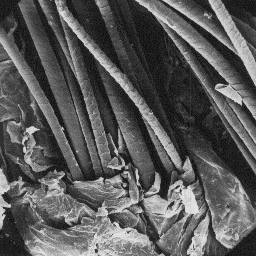 Myocastor coypus
Myocastor coypus
----------------
English: Nutria
German: Sumpfbiber
French: Ragondin
Spanish: Coipo
Distribution areas
------------------
The nutria can be mainly found in Brazil,
Argentina and Chile and in other areas of
South, Central and today also in North
America, where they are bred on farms. This
animal is now bred on farms in many parts of
the world.
The surface structure
Description of the fur of the skin, 200x
----------------------
This skins are from 30 to 90 cm long. The undercoat is fine and grey-blue
in colour. The coarse guard hairs are lustrous, brown and straight. The
thickness of the underfur layer is in the range of 6 to 16 mm. It is most
dense on the belly. The guard hairs are from 20 to 60 mm long. The winter and
summer coats are similar in colour. There are some different colour
variantions obtained by improved breeding on farms.
|
|
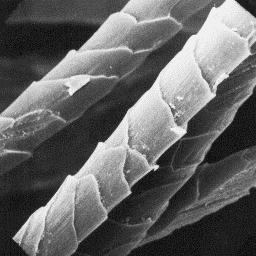 Myocastor coypus
Myocastor coypus
----------------
English: Nutria
German: Sumpfbiber
French: Ragondin
Spanish: Coipo
Structure of the hair
---------------------
The microscopic structure of the skin
surface is furrowed. The individual hair
follicles cre narrow with straight edges.
The average follicle contains a cluster of
10 or more fibres.
The fine fur fibres are straight, with a The cuticular structure
diameter of 7 to 15 µm. The cross-sectional of the fine fibres, 2000x
outline is usually ellipsoidal and the
cuticulcr scales are of the cornet-like type. The scales are usually grooved
and the margins are straight. The medullar column is narrow (a little less
than one half of the fibre's diameter) and belongs to the uniserial ladder
type. It is unbcoken longitudinally and is central symmetrical shaped in
cross-section. The medullar infilling substance often has a granular detailed
structure.
|
|
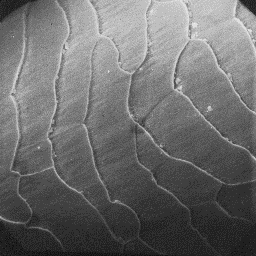 Myocastor coypus
Myocastor coypus
----------------
English: Nutria
German: Sumpfbiber
French: Ragondin
Spanish: Coipo
The intermediate fibres have a diameter
of 30 to 80 µm, and their cross-sectional
outline is ellipsoidal. The cuticular
scales are even tile-like in shape with a
grooved surface and straight scale margins.
The medulla is narrow, unbroken and central
symmetrical-shaped in cross-section. The
overall ctructure of the medulla belongs to
the tubular type, with either a granular or The cuticular structure
amorphous infilling substance. of a guard hair, 2000x
The guard hairs are ellipsoidal in cross-section and have a diameter in
the range of 60 to 120 µm. The cuticular ccales are even tile-like in shape
with a grooved surface and straight margins. The medullar column is narrow,
unbroken and central symmetrical-shaped in cross-section. The medullar
structure is of the tubular type and the infilling substacce has either a
granular or an amorphous internal structure.
|
|
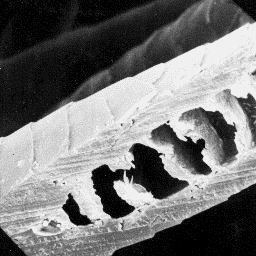 Myocastor coypus
Myocastor coypus
----------------
English: Nutria
German: Sumpfbiber
French: Ragondin
Spanish: Coipo
Longitudinal section
of an intermediate fibre, 600x
|
|
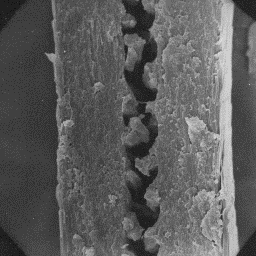 Myocastor coypus
Myocastor coypus
----------------
English: Nutria
German: Sumpfbiber
French: Ragondin
Spanish: Coipo
Longitudinal section
of a guard hair, 400x
Numerical code for nutria skin structure
----------------------------------------
Surface of the skin: 3-4-3
Fine fur fibres: 2-5-2-1-3-1-1-1-6-7.15-5.18
Intermediate fibres: 2-2-2-1-3-1-1-12-6.8-30.81-15.31
Guard hairs: 2-2-2-1-3-1-1-12-6.8-60.121-20.61
|




